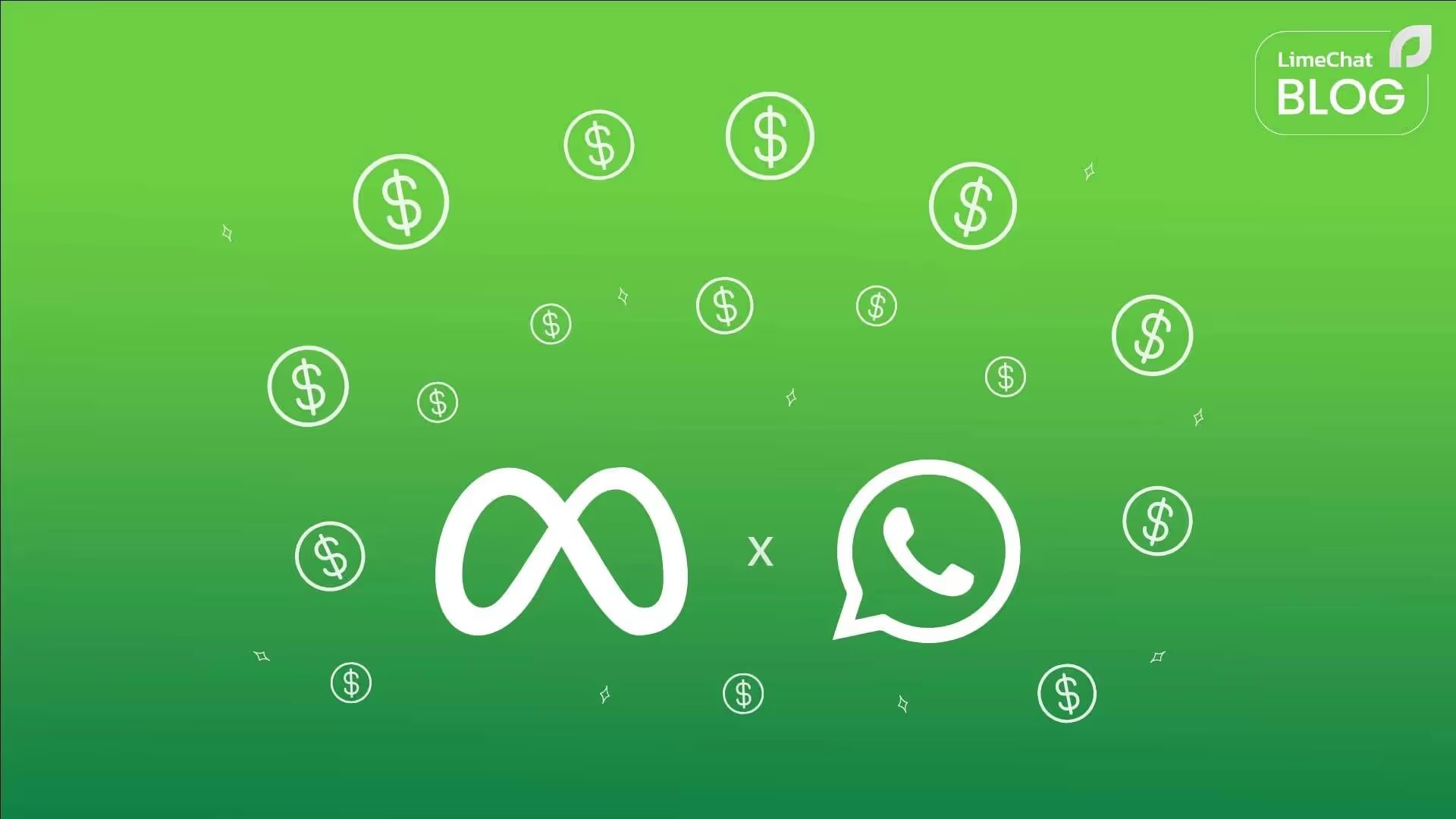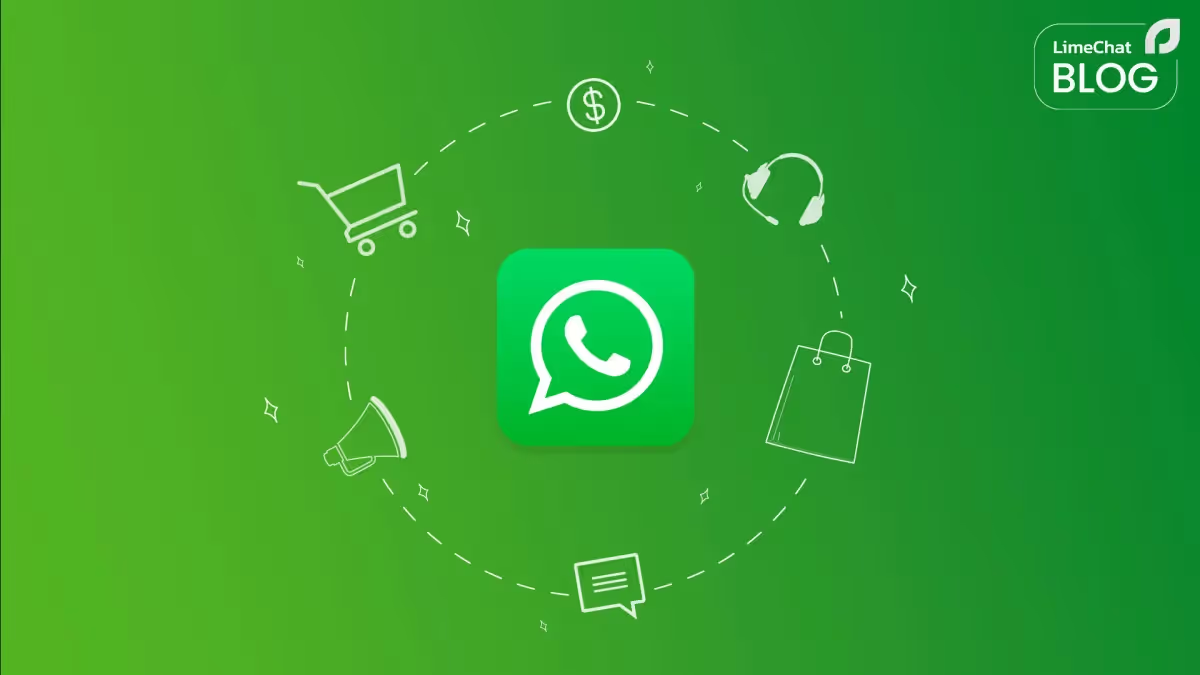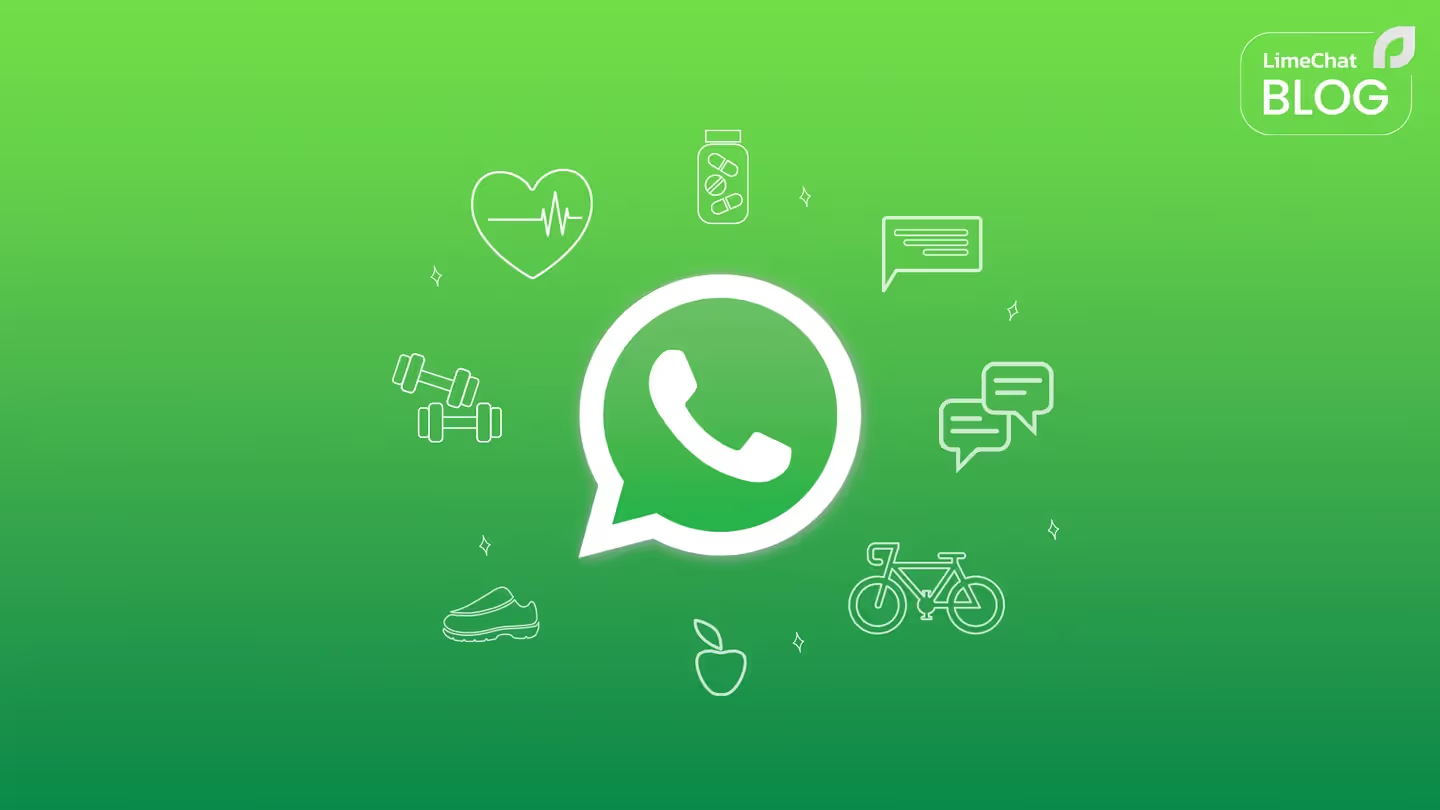This is why WhatsApp's New Pricing is BETTER for D2C

Meta recently introduced updates to their WhatsApp Business Platform and its conversation-based pricing. It’s a rolling update that periodically introduces fundamental changes to how WhatsApp will be used by businesses moving forward. The launch timeline for this update begins on February 2nd, 2023, and completes by June 1st, 2023.
WhatsApp doesn’t charge in the traditional way of ‘per-message’ like SMS but in 24-hour sessions termed as ‘conversation’. Between every session, the business/user can send an unlimited number of messages but will only be charged once at the point of initiation.
Is WhatsApp marketing going to be more expensive? Yes and no.
In a nutshell, D2C brands will now be able to focus on their high-intent buyers and initiate campaigns that can be far more efficient than before, if done correctly!
Let’s first take a deep dive into what the update entails-
WhatsApp Conversation pricing 2023 explained
Previously, depending on how the conversation was initiated whether by the user or the business, WhatsApp incurred a set fee of -
0.48 INR for business-initiated conversations
or
0.29 INR for user-initiated conversations.
While it was convenient to have a flat fee for both business-initiated and user-initiated conversations, the new categories hand greater control to the businesses to allocate resources more effectively toward their customers.
What’s new
Beginning June 1st, 2023, Meta will adopt new prices to their Whatsapp business platform and charge them based on the purpose of the conversations, with this they’ve also introduced categories under business-initiated conversations.
What are Business-initiated conversations on WhatsApp?
- Utility conversations (0.31 INR) - Send a specific, agreed-upon request or transaction or update to a customer about an ongoing transaction, including post-purchase notifications and recurring billing statements
- Authentication conversations - Enable businesses to authenticate users with one-time passcodes, potentially at multiple steps in the login process (e.g., account verification, account recovery, integrity challenges)
- Marketing conversations (0.73 INR) - Include promotions or offers, informational updates, or invitations for customers to respond/take action. Any conversation that does not qualify as utility or authentication is a marketing conversation.
What are User-initiated conversations on WhatsApp?
- Service conversations (0.29 INR) – These are all user-initiated conversations
Free Conversations
There are two incoming changes to the free conversations offered by Meta for businesses to build experiences with their customers using WhatsApp
Free Tier Conversations - First 1000 conversations of every month are free. Before the update, business-initiated and user-initiated conversations were included in this count.
Effective June 1, 2023,f. Free tier conversations will only include user-initiated conversations or service conversations moving forward.
Free Entry Points Conversations - Conversations that are initiated when a user clicks on Ads that Click to WhatsApp or Facebook Page call-to-action buttons are not charged.
Starting March 1, the session duration for conversations driven from these free entry points will be extended from 24 hours to 72 Hours. Businesses can reply with a template during this period and it won’t open a different conversation i.e they will not be charged.
How will you be charged under the new WhatsApp Business Pricing?
When using WhatsApp at scale, businesses use pre-approved templates to initiate conversations with their audience. Previously, all these templates were charged under a single banner of business-initiated at 0.48 INR per conversation.
WhatsApp conversation pricing will now be based on the template category.
This means that when a template is delivered, it starts a new conversation of that category and incurs the charge of that conversation category unless the template is delivered during an open conversation of that category.
For example, if a utility conversation is open and a marketing template is delivered within that open conversation, a new, separate marketing conversation is opened and a marketing conversation charge is initiated.
However, sending multiple templates of the same category within an open conversation will not incur additional charges. For example, a business can send multiple utility templates in an open utility conversation with no additional charges.
Service conversations will still only be initiated when a user initiates the conversation with the business. A 24-hour service window will be opened when a service conversation is initiated, business can respond within that service window with unlimited free-form messages without incurring an additional charge.
If a business replies to a user with a template message or sends a template message in an open service conversation, this will start a new conversation based on the template category. The business will be charged as per the category of the template delivered.
The exception to this is free entry point conversations. During the free window, businesses can send multiple templates of different categories, and no new conversation will be opened.
Understanding Whatsapp Templates
Meta has introduced 3 new categories under the business-initiated conversations with this update. All template messages will be marked and charged as per their respective category.
Starting April 1, 2023 template approval will require category validation using new categories — utility, authentication, and marketing.
Utility templates in WhatsApp Marketing
Utility templates are used in response to a user’s action. The purpose of a utility message is to update the user regarding their specific agreed-upon transaction/order.
Utility templates can accomplish any of the following:
- Confirm or suspend a transaction
- Provide an update or reminder post-transaction.
Any template that has a mix of utility and marketing content will be classified as a marketing template and will be charged as such.
Authentication templates
These templates serve the purpose of authenticating a user. Typically by delivering one-time passwords for login & verification codes for new registrations.
Authentication templates can also be used at other instances of the login process like account recovery & integrity challenges.
Marketing templates
These templates include promotions or offers; welcoming / closing messages; updates, invitations, or recommendations; or requests to respond or complete a new transaction. They do not relate to a specific, agreed-upon transaction and instead may relate to the business and/or its products/services.
Any template that has a mix of utility and marketing content will be classified as a marketing template.
Why is Meta changing WhatsApp Business Pricing?
In a nutshell, to further monetise the platform and improve the quality of marketing.
Expanding WhatsApp for Business
WhatsApp generated an estimated $906 million dollars in 2022 for Meta, that’s about 2.8% of Meta’s total revenue for 2022. WhatsApp’s model for revenue is solely dependent on WhatsApp for Business.
WhatsApp with its 2.4 Billion monthly active users is of considerable scale & reach. Businesses globally are recognising the power of personalisation and direct access to the end customer. Perhaps that’s why spending on WhatsApp for Business is growing 2X year on year.
Meta senses a real opportunity to monetise the platform further with the rapidly growing demand. Additionally, this update also attempts at collating Meta’s Ads platform and WhatsApp for business by incentivising businesses to use both platforms in order to achieve a greater ROI.
Power in the hands of customers
WhatsApp’s reach and cost-effectiveness made it a very popular and attractive platform for businesses and marketers to interact with customers. Idealistically the aim was to provide great customer service and promote products directly through their inbox.
Unfortunately, the platform soon became the perfect playground for spammers & lazy marketers.
Low costs of messages mixed with a large reach made it very easy for marketers to blast & mass broadcast generic messages, equivalent to internet pop-ups of 2005 or SMS today.
In order to curb negative sentiment spam creatives among WhatsApp’s user base. It’s handing the power back to the users. How?
By incentivising Click-to-WhatsApp ads.
Businesses are pushed more towards convincing their customers to initiate the conversation rather than them doing it. This update offers an increase in the service window of a user-initiated conversation that originated from a Click-to-WhatsApp ad.
From 24 hours to 72 hours, within which a business can send a template of any category and still not be charged.
Subsequently, the free first 1000 conversations that Meta offers for businesses every month will now only be counted when a conversation is user-initiated. Every business-initiated conversation is chargeable.
Moving forward, businesses will have to be more cautious about mass broadcast marketing messages due to the increased price & expand their advertising efforts to get users to talk to their brand.
The update forces businesses to level up their marketing in order to yield effective results from WhatsApp. It demands marketers to do more research and understand their audience to reach them efficiently and in a meaningful way.
What should your D2C brand do?
The update affects every aspect of your marketing campaigns, from targeting to ad copy, and post-conversion.
To achieve success businesses will need to be smarter in the ways they utilise WhatsApp.
Take a look at our top tips below on how to navigate the new pricing and still leverage WhatsApp as a revenue/growth channel…
Use Smart Segmentation
Prior to the update businesses would not have to care about segmentation, as any conversation initiated by them cost the same 0.48 INR. All they’d need to do is to is lookout for who’s opening their message and/or responding to them as a metric for an “engaged customer.”
The new categories and their respective pricing bring in the need for businesses to further segment their customer base.
You need to identify the high-intent buyers who engage with their brand and focus their marketing efforts on them. While churning out the ones who don’t.
Businesses will need to look at the history of the customer with the business and how they engage with their messages - do they have repeat purchases? do they only open promotional messages that include a discount? Do they respond to feedback campaigns and restock reminders? Do they initiate the conversation with the business frequently? Etc.
Identifying customer behaviour to segment is the first necessary step a business must take to competently market on WhatsApp in the future.
The keen-eyed ones must have noticed that while marketing conversations have increased in price, utility conversations are now cheaper.
One way businesses can segment their customer base is by gathering insights into which customers are responsive to utility conversations. Like how often does the customer open utility messages?
If not often then it can be understood that the customer either does not engage with your brand or does not use WhatsApp enough for you to justify incurring the cost of a marketing conversation with them.
Enable 2-way communication
The small fractional difference between user-initiated and business-initiated conversations before the update made it unnecessary for businesses to engage in a meaningful way with the customer. Brands played the numbers game and only relied on their massive reach with the WhatsApp platform to deliver their marketing material; kind of like putting up a banner on a busy highway.
You can just send marketing messages that are not interactive, engaging, or creative and still get manage to get conversions by providing discount codes.
But, this method does not add provide any value to the user nor build an experience, it only distills WhatsApp down to a one-way advertising platform. (which it is not)
To change this - Meta’s increased the price of marketing conversations. Hugely increasing the gap between the costs of user-initiated and business-initiated conversations. And, expanded upon the free conversations offered.
Now the monthly free 1000 conversations will only include user-initiated conversations, so businesses are urged to be creative and emphasise engaging with their customers. It’s no longer possible to ignore the cost-effectiveness of using WhatsApp for business to engage with customers and build a back-and-forth relationship.
One of the aims a brand on WhatsApp will need to have is to increase user engagement by delivering messages that evoke responses and building interactive experiences.
Creating an inclusive path of 2-way communication between the brand and the customer. Where the customer organically interacts with the brand as much as the brand does with the customer.
For a brand using WhatsApp, the ratio between their user-initiated and business-initiated conversations will be a defining factor in the success of their marketing efforts.
Use Personalised messaging
With the new update, businesses will now have the control to direct their marketing messages to audiences that are enthusiastic about the brand. This audience sect will be the one that proves to be most effective and responsive to their WhatsApp marketing efforts.
But, how would they scale the audience size of people who are enthusiastic and engage with the brand?
By personalised messaging.
Personalisation is the most effective and necessary characteristic any marketing material needs to have. Personalization holds incredible power across the board - it increases customer satisfaction, engagement, and open rates.
Without personalisation, your brand can come off as generic and cold.
Customers today expect their ads to be tailored to their needs & experiences in order to provide any form of value.
The expectations are the same on WhatsApp as well. If the messages are not specific to the customers’ interests then they’ll be ignored. The customer will rarely interact with your brand’s messages as they are of no value to them, making it impossible for a brand to build a relationship with the customer and get them to engage.
Without personalisation, a customer will never qualify into your brand’s ‘highly engaged’ segment. To transform this customer from unresponsive to highly engaged, they must receive personalised messages on WhatsApp based on their history with the brand and its products.
For example, a customer expresses interest in women’s dresses. They show their interest by inquiring about the dresses, maybe add some to their cart, and perhaps even checkout. Their history with the brand shows a clear interest in that particular product. A customer like that would not respond to promotional messages and offers being sent to them for men’s coats!
Smart marketers would cater to that customer’s interest by sending customised promos and discounts for women’s dresses. Even smarter marketers would then further expand by associating products with the customer’s taste, like sending prompts to browse collections of their brand’s women’s shoes or fine jewellery.
The increased cost of marketing conversations has compelled businesses to segment customers by their engagement and focus their primary marketing efforts on high-intent buyers. But, secondary efforts should be set towards growing this segment of engaged customers to get greater returns.
Summarising the new WhatsApp Business Pricing
Overall the new update is geared toward improving the experience of the end user. I.e the recipient of your brand’s WhatsApp messages.
To do so, Meta has cleverly introduced these changes in the update that tip the balance in favor of quality marketing. It’s now evident that businesses will need to focus more on understanding their customers and focusing on the ones that resonate with them.
LimeChat helps you create segments of your happiest and high-intent customers & engage them with personalized campaigns.
Our dedicated DTC success manager will be happy to take you through these unique features so you can ace your Whatsapp Marketing strategy, irrespective of these changes/updates.
Transform your marketing and support today







